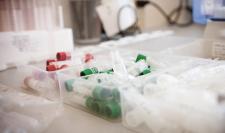Sperm Is a Focus of Start-Ups Looking to Boost Fertility
By Fiorella Valdesolo,
WSJ Magazine
| 06. 08. 2022
“Where is the we?” It’s the question that was the driving force for Vida Delrahim and Ronit Menashe when they created WeNatal, a new brand of prenatal supplements that aims to be more inclusive. In the process of trying to conceive, couples often use the word we. We’re trying to get pregnant. We’re having trouble conceiving. We’re having a baby. But, as Delrahim and Menashe realized after their own individual struggles to conceive, despite all the we, much of the burden of fertility optimization continues to fall on women. It’s an imbalance that WeNatal and a number of other start-ups are starting to address.
In the quest for high-quality embryos and viable pregnancies, sperm is critical, says Toronto-based reproductive endocrinologist Dan Nayot, who is chief medical advisor for fertility supplement company Bird&Be. And good sperm is about both quality and quantity. In a routine semen analysis, Nayot generally looks at the volume of semen (a combination of seminal fluid and sperm); sperm concentration (how many millions of sperm per millimeter); sperm motility (how many are actually moving...
Related Articles
By Diaa Hadid and Shweta Desai, NPR | 01.29.2026
MUMBRA, India — The afternoon sun shines on the woman in a commuter-town café, highlighting her almond-shaped eyes and pale skin, a look often sought after by couples who need an egg to have a baby.
"I have good eggs,"...
By George Janes, BioNews | 01.12.2026
A heart attack patient has become the first person to be treated in a clinical trial of an experimental gene therapy, which aims to strengthen blood vessels after coronary bypass surgery.
Coronary artery bypass surgery is performed to treat...
By Staff, ScienceDaily | 01.05.2026
Scientists at UNSW Sydney have developed a new form of CRISPR technology that could make gene therapy safer while also resolving a decades-long debate about how genes are switched off. The research shows that small chemical markers attached to DNA
...
Following a long-standing CGS tradition, we present a selection of our favorite Biopolitical Times posts of the past year.
In 2025, we published up to four posts every month, written by 12 authors (staff, consultants and allies), some in collaboration and one simply credited to CGS.
These titles are presented in chronological order, except for three In Memoriam notices, which follow. Many more posts that are worth your time can be found in the archive. Scroll down and “VIEW...




